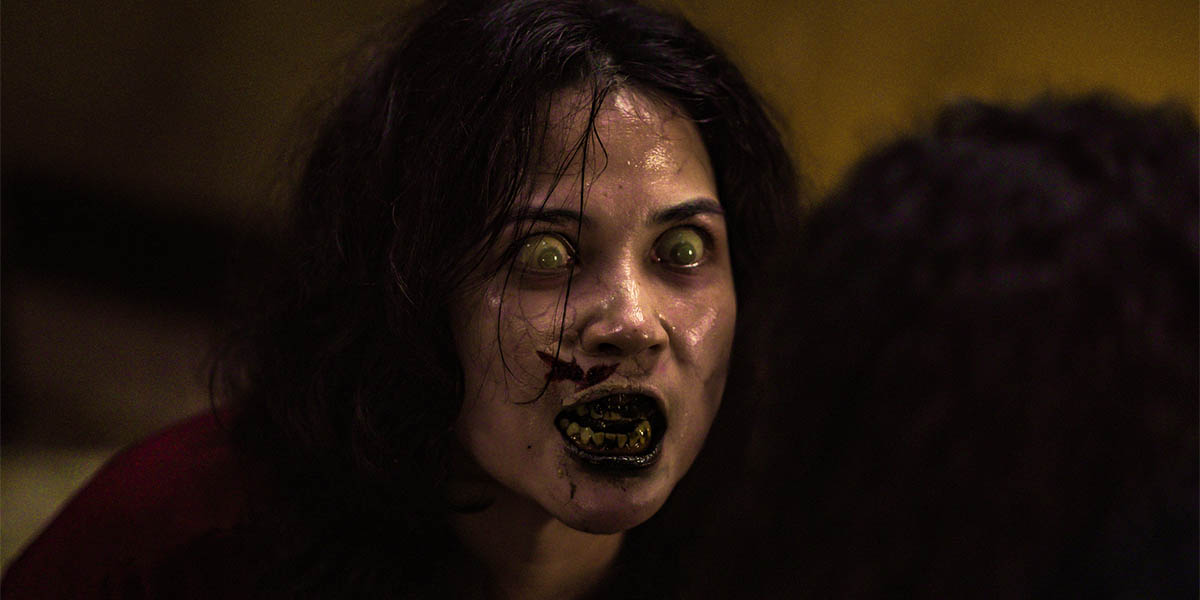
One of the more popular sections of the Chicago International Film Festival each year is the After Dark sidebar, a collection of films from around the world that are just a bit different from the usual fest fare—something a little stranger and wilder and containing plenty of sex, violence and straight-up weirdness to appeal to viewers with somewhat more outré tastes. This year was no exception with a number of films from around the world designed to take viewers on very strange rides via projects ranging from stabs at old-fashioned folk horror to an overt homage to the early works of one of the legendary names in underground cinema.
As the Indonesian gross-out extravaganza “The Book of Sijjin & Illiyyin,” which earned director Hadrah Daeng Ratu the Best Director award at the genre-based Fantasia Fest earlier this year, a bizarre incident in a small village has left a couple dead and their young daughter, Yuli (Firzanah Alya) orphaned. Because the dead man had another family before this, Yuli is placed into the care of his former wife, Ambar (Nazi Djenar Maisa Ayu) and while this new family is certainly a step up on a wholly material basis, the majority of them, particularly Ambar, essentially treat Yuli as a servant and never pass up an opportunity to remind her that she is nothing more than a bastard. When the story picks up 20 years later, Ambar has just passed and her daughter, Laras (Dinda Kanyadewi), has replaced her as matriarch and is perhaps even more cruel and vindictive towards her now-adult half-sister (now played by Yunita Siregar) than her mother.
Having borne all of this nastiness for years, Yuli finally snaps and seeks out a local mystic to help put an all-encompassing curse on both Laras and her entire family, most of whom have not animus towards Yuli but who have done nothing to try to stop the abuse. This, by the way, is no run-of-the-mill, chant-a-few-incantations kind of curse—this is an especially ghastly one that involves digging up Ambar’s recently buried corpse and doing all sorts of gruesome things to it night after night in order for it to work. It definitely works as no one in Laras’s orbit—not even her young son—is spared a bloody demise but there is a hitch. Yuli’s ritual is one that she cannot just stop and if she doesn’t complete it within 40 days, the power she has unleashed will double back on her instead. Meanwhile, Laras’s daughter Tika (Kawai Labiba), a devout Muslim who was always kind and respectful towards Yuli, has to figure out what it is that is befalling her family and end it before it they are all gone.
“The Book of Sijjin & Illiyyin” has been made with a certain amount of skill and style, some of the kills are of a particularly gnarly nature and it is never boring, I suppose. The trouble is that once you get beyond the blood and weirdness, there is not much of anything else there. The film lurches from one gory event to another and spends as little time as possible on anything regarding the story or the characters. This proves to be especially frustrating in the case of Yuli, who we are presumably meant to feel some kind of sympathy for, despite the actions that she takes against Laras and her family, but the leap from put-upon doormat to symbol of vengeance proves to be way too abrupt—imagine if Carrie had simply rained psychic hellfire on her cruel classmates right there in the locker room. Ultimately, the film is not so much bad as it is formulaic—unless you have somehow never seen a horror film before involving a put-upon person wreaking supernatural havoc upon their oppressors before, there is very little here that you haven’t seen before.
Horror with spiritual overtones is also a key factor in “The Holy Boy,” an Italian import from Paolo Strippoli that premiered earlier this year at the Venice Film Festival and which won a couple of prizes at the recent Fantastic Fest. In this one, Michele Riondino stars as Sergio, a judo expert who, haunted by a tragedy in his past, has landed a temporary position as a substitute gym teacher in Remis, a remote town known as “The Valley of Smiles” where everyone seems resoundingly cheerful all the time, a bit strange since the town was also once the sight of a deadly train accident. Needless to say, his moodier demeanor does not quite fit in with the other townspeople and it is at this point that friendly bartender Michela (Romana Maggiora) lets him in on the town’s big secret—a shy 15-year-old boy named Matteo (Giulio Feltri) who, in a weekly ritual, takes away all of the pain and sorrow of those who he embraces and leaves them in a near-blissful state. While the locals assure him that everything is perfectly fine with this, the more cynically-minded Sergio suspects that the arrangement is not nearly as benign as it seems—if nothing else, where does all the pain that Matteo is supposedly absorbing actually go? As he tries to get to the bottom of it all, Sergio befriends Matteo, a move that arouses suspicions among Matteo’s father and the other townspeople, who are worried that he is in the process of ruining what has been a very good thing, at least for them. Before long, both Sergio and Matteo make discoveries about the true nature of the boy and his so-called gift that threaten to have violent repercussions for the entire town.
As opposed to “The Book of Sijjin & Illiyyin,” “The Holy Boy” is more of a slow burn, preferring to spend the first half of its running time gradually building a sense of tension before getting to the bigger shocks that it is building to towards the end. This approach might drive less patient viewers to frustration, wishing that Strippoli would just get on with it already. However, those with a little more patience should appreciate the way in which the film serves as a precise and cutting examination of the perils of trying to offload one’s own personal pain onto someone else without giving any thought to the aftereffects for all involved, no matter how willing they may seem to be to accept it. This is underscored by the central performances from Riondino and Feltri, both of whom are quite good in the ways that they present the strange and often-shifting nature of their relationship. When the more overtly horrific events do evenutally kick in, they are indeed strange and disturbing and ultimately more effective than your usual gore fest. Although not flawless—at over two hours, it does contain a few scenes here and there that run on a little too long for their own good—“The Holy Boy” is an intriguing chiller that is more interested in trying to disturb viewers than in simply grossing them out.

Which brings us to “Anything That Moves,” the latest effort from Chicago filmmaker Alex Phillips, whose previous effort was the decidedly icky body horror/comedy hybrid “All Jacked Up and Full of Worms.” Upon seeing that one, I wrote “Although I found the whole enterprise to be disgusting, pointless, and seemingly endless (despite only running for 72 minutes), I concede that others may find the weird imagery and cheerfully repulsiveness to be entertaining”—outside of adjusting the running time to 80 minutes, that quote more or less stands for this one as well.
Set in Chicago and shot on 16MM, this one centers on Liam (Hal Baum), who, along with his girlfriend Thea (Jiana Nicole), works as a combination delivery person and sex worker for an app that offers customers both erotic satisfaction and tasty sandwiches and is good enough at his job that when his clients, both male and female, achieve climax, it is accompanied by a glowing light not unlike the one emanating from the briefcase in “Pulp Fiction.” However, while Liam is going about bringing pleasure to his clients (including characters played by adult film legends Ginger Lynn Allen and Nina Hartley) and conducting his oddball relationship with Thea—who, in the opening scene, employs him to deflower her younger sister on her 18th birthday as a gift—a serial killer is going around bumping off a number of those he has serviced, gouging holes in their heads and sticking clues inside. Inevitably, a couple of cops (Jack Dunphy and Frank W. Ross) become convinced that Liam is their prime suspect and so he must now try to figure out who is committing the killings while trying to avoid getting murdered himself.
Shot on grainy 16MM, the film is meant to simultaneously evoke the spirit of sleazy low-budget sexploitation film of the 1970s, gory Giallo-style slasher efforts of the same era and the giddily trashy anarchistic spirit of the early pre-“Polyester” efforts of John Waters but even if you happen to be a fan of those particular and admittedly peculiar sub-genres (as I am), this particular mash-up just does not quite click. Although the sexual activity is plentiful, very little of it could be described as genuinely erotic, though perhaps your mileage may vary in this regard. Likewise, while there is plenty of blood and brutality on display as well, none of it is particularly scary or gripping and the whole mystery aspect is more tedious than anything else. As a Waters homage, it misses the mark because while Phillips loads on the outrageousness throughout, he lacks both the droll sense of wit that Waters included in his films alongside the doggie-do snacking and performers as undeniably charismatic as the likes of Divine and Mink Stole—aside from Baum, whose likable dorky take on Liam is unexpectedly charming at times, the actors mostly range from meh to stridently annoying.
To be fair, “Anything That Moves” at least proves itself to be somewhat of a step up for Phillips from his previous feature, at least in terms of coherence. As a filmmaker, he does have enough of a vision—garish as it may be—to suggest that he might one day make a genuinely solid film, even if he has not yet done so as of yet, and at a time when American cinema, despite what dubious opinion polls might suggest, is at a particularly sexless point, the rampant horniness on display throughout is something that deserves to be celebrated. In the end, though, for all of the allegedly shocking material on display, the one moment that truly stands out for me is one where a couple of characters take a break from the mayhem to prepare and eat a couple of Chicago-style hot dogs sans ketchup—in a film that otherwise tries to be as transgressive as can be wherever possible, I was amused to see that at least one taboo was still being upheld.
Source link

